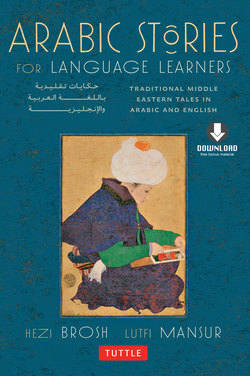Читать книгу Arabic Stories for Language Learners - Hezi Brosh - Страница 8
На сайте Литреса книга снята с продажи.
ОглавлениеIntroduction
This book contains short Arabic stories that were told both orally and in writing through the ages from the pre-Islamic period (Aljahiliyya) until the 15th century.
The stories have been selected from a wide variety of classical literary sources (printed during the 20th century) such as Qisas Al’arab by Muhammad Abu-lfadl Ibrahim, Almustajaad min fi’lati-l’ajwaad by Almuhsin Bin Ali Attanukhi, Tara’if min Alturaath Al’arabi by Abd Al’amir Bin Ali Muhanna, Nawader Goha Alkubra by Khalil Hana Tadrus, Albayan Wattabyin by Aljahiz, Al’iqdu-lfarid by Ibn Abd Rabbihi, Jawahiru-l’adab by Alhashimi and many more. They reflect Arab culture, and with it the influence of such cultures as the Persian, the Byzantine, and the Greek.
In the manner of most folk tales and fables, the stories are designed to entertain listeners and guide them through life’s dilemmas. As specifically Arabic stories, they offer advice on overcoming the difficulties of desert life. Finally, they share with readers and listeners the valuable lessons we can take from the experiences of others.
The stories in this collection bring the Arab culture to life a pithy and colorful way, and offer readers a glimpse of the social, cultural and religious aspects of the Arab lifestyle before and after Islam. The values and moral norms of the desert dwellers—such as loyalty, hospitality, friendship, family bonds, keeping promises and telling the truth—are vividly if concisely portrayed. The traditional manner of the storytelling conveys that important sense of wisdom passing from the elderly to the young, so that children might learn life’s basic skills—how to get out of trouble, how to earn rewards, even how to save their own lives. Some stories expose readers to the original context behind proverbs, while others describe the creation of Islam according to the Islamic tradition. The Caliph, (Muslim ruler charged with providing leadership after the Prophet Muhammad), the judge, the sheikh (an old man, also a tribal leader because of his rich life experience and wisdom), the poet and other figures such as Juha/Goha (a funny man, a wise fool, whose stories are full of wit and wisdom), a thief, a poor man, and even animals constitute the main characters of these stories.
The stories in this collection have been edited and simplified for teaching purposes. We have replaced complex grammatical structures with simple ones that, while more comprehendible, are nevertheless intended to challenge students. We have tried to keep the vocabulary to words that are in common use. Each story focuses on only one incident, has a single plot, a single setting, a limited number of characters, and takes place over a short period of time. Arabic Stories is geared toward intermediate and advanced students at the secondary and university level, adult language classes, and individual study. The stories are recorded to help students develop and enhance listening comprehension skills.
Alongside the Arabic versions we have provided an English translation to help students who are in the early phases of learning the language. It is our hope that, with these translations, readers who are not yet students of the language may enjoy the glimpse these stories provide into the Arab culture and Arab life.
Enjoy your reading.
2013
—Hezi Brosh (Ph.D.), United States Naval Academy, Annapolis, Maryland
—Lutfi Mansur (Ph.D.) The Academic Arab Institute, Beit Berl College, Israel
